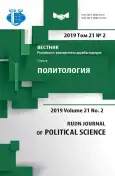CHINESE PERCEPTION OF INDO]US NEXUS: IMPLICATIONS FOR CHINA IN SOUTH ASIAN REGION (Brief Overview)
- 作者: Nisar R.D.1
-
隶属关系:
- Central China Normal University
- 期: 卷 21, 编号 2 (2019)
- 页面: 311-322
- 栏目: POLITICAL PROCESSES IN CONTEMPORARY WORLD
- URL: https://medbiosci.ru/2313-1438/article/view/339706
- DOI: https://doi.org/10.22363/2313-1438-2019-21-2-311-322
- ID: 339706
如何引用文章
全文:
详细
After the collapse of the USSR, the US changed its policies, shifted its priorities and started viewing China’s economic emergence as a great threat to US interests. Due to the rapid economic growth and military development, the People’s Republic of China has become a rival for the US in the global arena. Meanwhile, as the US is reshaping its policy in accordance with the modern geopolitical reality, it starts regarding India as a powerful ally for holding China back. The close rapport between India and the USA is being established on the account of economic liaisons and combined efforts against security threats. Currently, India and the US are redefining their affiliations and building a potent nexus to secure their common interests, particularly in keeping China at bay. The formation of amicable Indo-US relations has resulted in the collective agenda for achieving the two countries’ common objectives in Asia. According to A. Tellis, the two foremost strategic goals of the two countries in Asia are: firstly, to contain the growing influence of China in Asia and its adjacent territories and establish Indian hegemony in the region; secondly, to promote friendly relations with other major actors in the region in order to garner support for India. The two countries’ strategic plan towards China is to isolate the country from the rest of the region. The presence of the US naval forces in the Indian Ocean and recent military exercises in Malabar have increased the US-India ties and have helped to establish control over Chinese naval and trade routes and sea lines of communication. Senior US officials have openly declared their intentions of strategic containment of China. As was noted by one of India’s leading political analysts John Cheian, “Washington’s primary goal is developing alliance with India in order to contain China”. The given article presents an outlook on the Chinese perception of the US-India nexus.
作者简介
Rana Nisar
Central China Normal University
编辑信件的主要联系方式.
Email: ranadanishnisar@gmail.com
PhD Student of the School of Politics and International Studies, Central China Normal University (People’s Republic of China)
Hubei, People’s Republic of China参考
- Bellacqua J. The Future of China-Russia Relations. Kentucky: University Press of Kentucky; 2010. 372 p.
- Bieri M. China in the Indian Ocean: Part of a Large Plan. ETH Zurich: Centre for Security Studies. 2014; 156.
- Cohen S.P. Emerging Power: India. Washington DC: Brookings Institution; 2002. 377 p.
- Deng Y., Wang F. China Rising: Power and Motivation in Chinese Foreign Policy. New York: Rowman & Littelfield Publications; 2005. 349 p.
- Garver J.W. Protracted Contest: Sino-Indian Rivalry in the Twentieth Century. Seattle: University of Washington Press; 2002. 462 p.
- Ganguly S. India as an Emerging Power. London: Frank Cass; 2003. 233 p.
- Ghoshal B. China’s Perception of India’s ‘Look East Policy’ and Its Implications. New Delhi: Institute of Defence Studies and Analyses; 2013: 82—89.
- Hayes J. Constructing National Security: United States Relations with India and China. New York: Columbia University Press; 2013. 224 p.
- Talbott S. Engaging India: Diplomacy, Democracy and the Bomb. Washington: DC. Brookings Institution Press; 2004. 268 p.
- Tellis A., Mirski S. Crux of Asia: China, India and the Emerging Global Order. Washington, D.C: Carnegie Endowment publishers; 2013. 254 p.
- Waqas R.M. Nuclearization and Indian Ocean: Opportunities and Challanges. Journal of Pakistan and Gulf Studies. 2017. Available from: https://cpakgulf.org/2017/05/29/nuclearizationof-the-indian-ocean-opportunities-and-challenges/. Accessed: 22.02.2019.
- Wagner C. The Effects of China-Pakistan Economic Corridor. German Institute for International and Security Affairs. 2016. Available from: https://www.swp-berlin.org/fileadmin/contents/ products/comments/2016C25_wgn.pdf. Accessed: 22.02.2019.
- Yoshihava T. Chinese View of India in the Indian Ocean: A Geopolitical Perspective. Strategic Analysis. 2012; Vol. 36; 3: 489—500. doi: 10.1080/09700161.2012.670446.
补充文件









